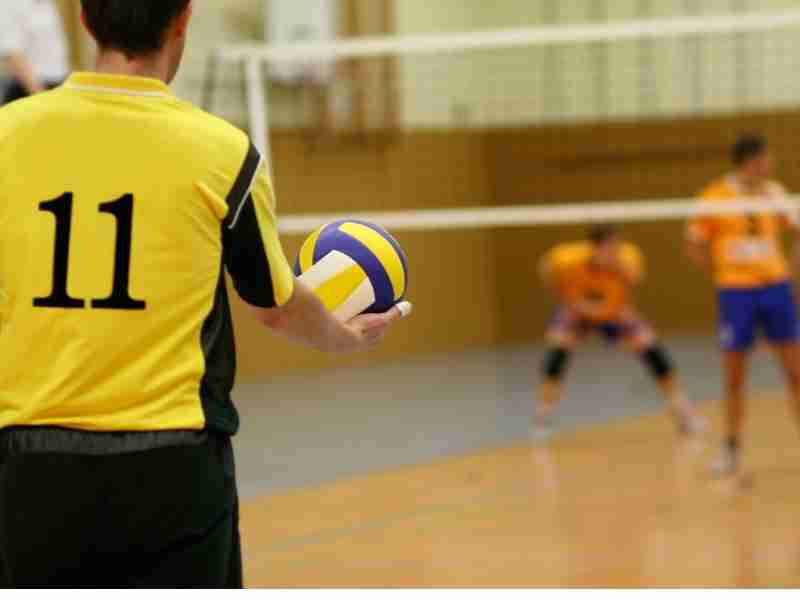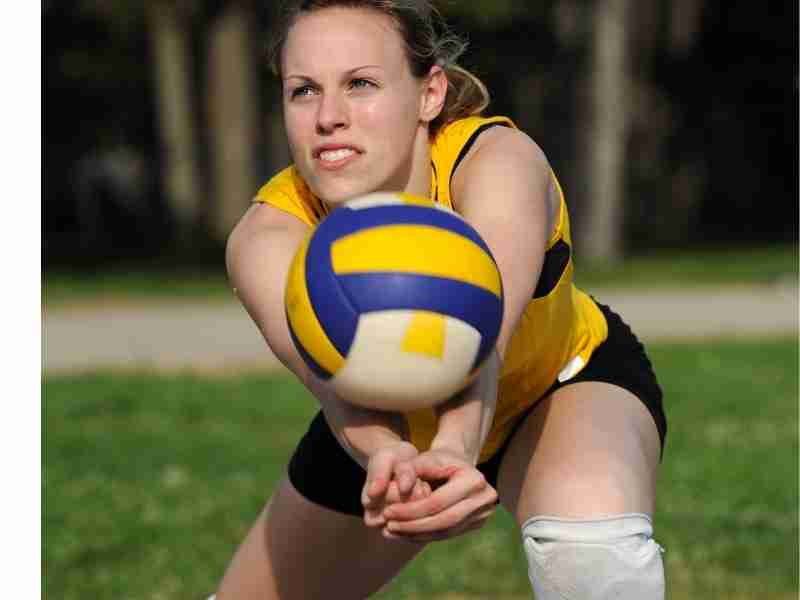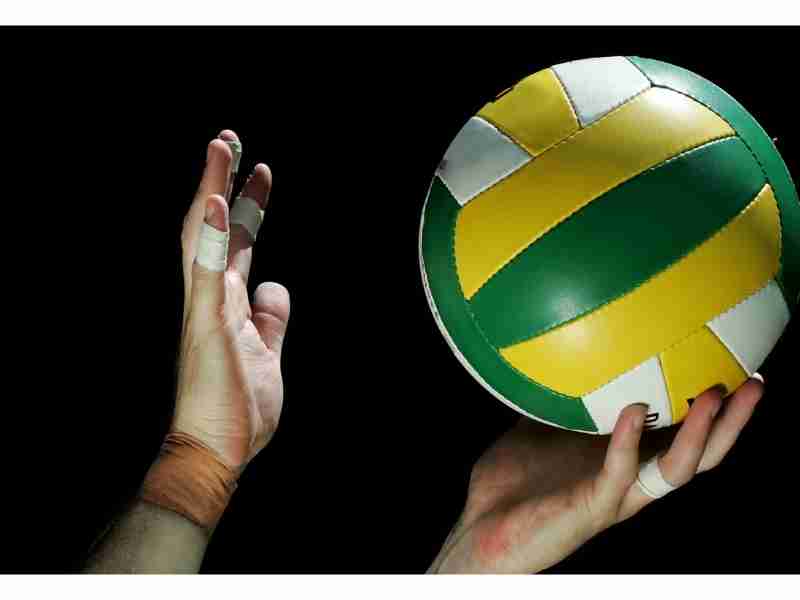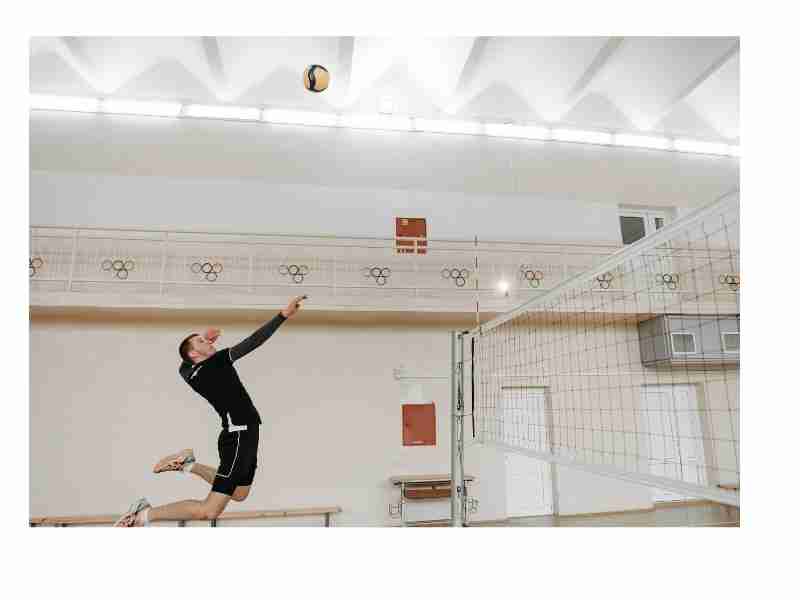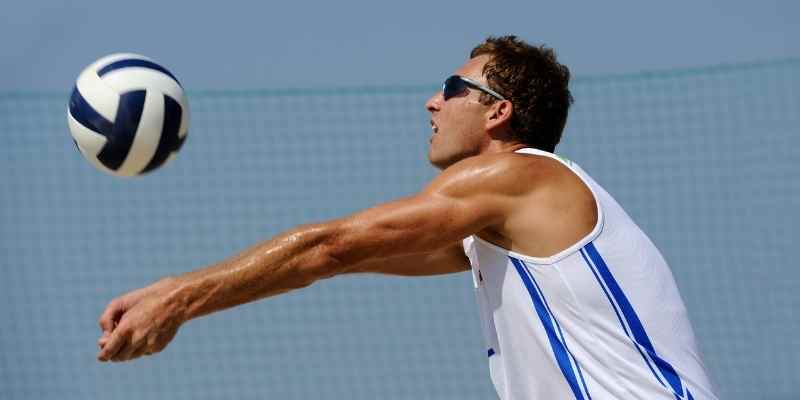
Do you know what a defensive specialist is in volleyball? A lot of people don’t. I will tell you what they are and why they are essential. They are players who play defense and specialize in it.
What Does the Volleyball Position of Defensive Specialist Mean?
A defensive specialist is a player that specializes in playing defense. They are responsible for digging up balls the other team hits and passing them to the setter. They typically do not play offense but may be called upon in certain situations.
Defensive specialists typically have good communication skills and a high level of fitness. They must be able to sprint after balls and dive for them when necessary. Playing defense can be demanding, but it can also be gratifying. It requires quick thinking and good decision-making skills.
Consistency is essential as a defensive specialist in volleyball. You must consistently make good passes during serve receive, digs, provide good coverage, and serve well. If you can do all of those things consistently, you’ll be a valuable member of any team.
And that’s what coaches are looking for in a defensive specialist – someone they can rely on to play their role well every game. So if you want to be a defensive specialist, work on being as consistent as possible in all aspects of your game.
The defensive specialist excels and makes impossible saves. They must be quick on their feet to be in the right place at the right time. They must also be able to read the opposing team’s offense to anticipate the next attack.
How Do Defensive Specialists And Liberos Differ?
In volleyball, two specialized positions are responsible for playing defense: the defensive specialist and the libero. Both players play an essential role in keeping the ball off the ground but have different skills and responsibilities.
The defensive specialist is typically responsible for blocking attempts at the net and digging up hard-hit balls. They often stay near the back row and use their height to their advantage.
On the other hand, the libero is a position that was created specifically for defense. They are smaller and quicker than other players on the court, making them ideal for chasing down loose balls.
The libero wears a different-colored jersey so the referees can quickly identify them. In addition, they are not allowed to serve or attempt to block shots at the net.
The DS can play the front row when necessary to assist the team on offense.
The libero has additional restrictions for contacting the ball above the net that the DS does not.
Some coaches consider the libero the primary serve receive player, while the DS is more concerned with defense throughout the game.
Why Is The Position Of Defensive Specialists A Great One To Play?
Volleyball is a game of quick reflexes and split-second decisions. As a defensive specialist, you are constantly reading the play and adjusting your positioning accordingly. No two volleys are the same, keeping you on your toes and thinking one step ahead.
In addition to being mentally sharp, defensive specialists must have excellent footwork and agility. It would be best if you were quick enough to get to any ball your way, and you also need the stamina to stay in constant motion throughout the match.
Playing defense can be grueling, but it is also advantageous. When you make a big dig or save a point with a perfectly timed dive, there is no feeling quite like it. If you are up for the challenge, a defensive specialist is an incredibly rewarding position to play.
Why Is Defensive Specialist The Hardest Team Position?
Volleyball is a sport that necessitates rapid movements and split-second decisions. As a result, the defensive specialist position may be the most difficult on the team. They must have incredible stamina and agility because they are responsible for covering the entire court. They must also predict where the ball will go and react quickly.
In addition, the defensive specialist often has to make diving saves, which can be incredibly challenging.
As a defensive back or libero, the coach has less to praise and more to criticize. They count on you to make the first contact when the ball crosses the goal line.
You don’t get as many kills or blocks as the other players. When you make a mistake, it is often magnified because it can cost the opposing team a point.
It’s a responsibility that you must take seriously and one that is proud of you. However, in many ways, it’s a thankless job.
All these factors make a defensive specialist one of the most critical players on the team.
Why Do Teams Need A Defender And Libero?
The DS and libero work well together regarding the back row to form a potent backcourt. The defensive specialist can come in and fill the defensive slot, while the libero can only replace one of those at a time. This allows the other four players to focus on offense for the duration of the rally.
Because of this, some of the best offensive players don’t cut it when it comes to defense. However, the DS and libero Duo can change that. They can communicate well and form an impenetrable force against even the best attackers.
Drills To Excel As A Defensive Specialist
Back Row Hitting Drill
When attempting to become a defensive specialist in volleyball, preparation is essential. Perfecting your back row hitting is one way to improve your skills. Begin by placing both feet parallel to the net, approximately shoulder-width apart. Then, jump off your left foot while swinging your right arm over your head and making contact with the ball in front of you.
When done correctly, this will result in a powerful hit that will send the ball deep into the opponent’s court. With practice, this drill can help you develop the accuracy and power needed to excel as a defensive specialist.
1. On Deck 4 on 4 Hitting Game
Deck 4 on 4 Hitting Game is a blocking and hitting drill that encourages players to communicate and work together as a team. It also helps players improve their hand-eye coordination and accuracy when hitting the ball. To set up the drill, four players line up on one side of the net, with one setter and three back row players on the team.
A player exits the game by making a hitting error. When they do, they are placed “on deck,” which means they must leave the court and perform sit-ups until their team allows them to return. They can only accomplish this by obtaining a kill.
2. Back Row 3 on 3
The back row 3 on 3 drill is one of the most effective drills for training defensive specialists. This drill simulates game conditions by having three attackers, a setter, and a passer in the back row.
The defenders must communicate and work together to cover the entire court.
In this drill, the coach begins by tossing the ball to one side of the court. The players on that side must then defend against the three attackers. The coach can limit the number of attacks made, for example, only back row attacks or only tips. This will help you to focus on your positioning and footwork.
After a set period, the coach will switch the ball to the other side of the court, and the players must then switch roles. This drill is excellent for developing your defensive skills and will also help to improve your footwork and positioning.
3. Back Row Dig + attack
The Back Row Dig + Attack drill is a great way to work on your back row attacking and setting. This drill requires a setter and a line of players on each net side. The first side will be playing traditional hitter, aiming for players across the net to provide them with a ball to dig.
The player on the second side will be in the back row and dig the ball to the setter. The setter will then set the ball back for a back-row attack. The setters should position themselves near or even slightly ahead of the attack line to allow the hitter to approach.
Back row players are essential in volleyball. Back row players, in particular, must be adept at digging the ball and transitioning quickly into an offensive position. This drill aims to help back row players improve their skills.
After attacking either side, the player will rotate to opposite the court’s end of the line. This forces the player to switch quickly from defense to offense, which helps them adjust to the game’s pace. This drill will help back-row volleyball players gain confidence and practice skills.
This drill is a great way to hone your back row skills while having a good time!
Passing Drills
In volleyball, the ability to pass is critical for all players, but it is crucial for defensive specialists (DS). A DS must have strong passing skills to effectively receive the opponent’s serve and set up the offense. These drills will help you develop the strength and accuracy necessary to break the opponent’s serve and keep your team in the game.
1. Double Feeder Passing
The double feeder passing drill is a great way to improve your passing skills. Two feeders work with each passer during this drill. They alternate sending different balls to the player, putting them under pressure to make quick passing decisions.
A ball cart should separate the two feeders to keep the action going. This drill will assist you in developing the quick decision-making skills required in volleyball.
2. A Balloon And A Ball
The Balloon and Ball Passing drill is a great way to increase your ball control and accuracy. This drill requires a volleyball and a balloon, and two or more people can perform it. Each player should line up behind the net in a line, with the back player holding the balloon.
The balloon will be hit over the net by the first player in line, who the next player will follow. The balloon should be passed around until it pops or hits the ground. The last person to touch the balloon, whether it pops or falls to the ground, is eliminated from the game. The last person standing wins the game.
Try balloon and ball passing the next time you are at volleyball practice to improve your ball control and accuracy.
3. Passing To Dive
The Passing To Dive Passing drill is one of the essential drills for any volleyball player who wants to become a defensive specialist. This drill simulates game-like conditions and forces the player to focus on proper passing technique while also dealing with the added pressure of an opponent diving for the ball.
The key to this drill is staying calm and maintaining a good grip on the ball. By doing so, you’ll be able to make clean, consistent passes that will leave your opponents picking themselves up off the floor repeatedly.
This drill is excellent for practicing your defensive skills. Start by positioning yourself in the middle back row. Have someone feed you the ball, then pass it to the setter. After passing the ball, you must play it yourself. This will help you practice your accuracy and precision.
If you pass well, you’ll need to hustle and dive into making the save. The goal is to create a contact that saves the ball, not a great hit. When you’re practicing, be sure to keep an eye on your coach. They will be able to tell when you’re passing too high.
Diving Drills
1. Passing From The Exercise Ball
A defensive specialist in volleyball is responsible for playing well in the back row and covering any hits that come their way. Defenders often use an exercise ball to help them improve their diving and passing abilities when practicing their skills.
To begin, the player is leaning their hips or belly on the ball and finding a place to balance, so they don’t fall. Next, a feeder will toss the ball while the player practices their platform pass. The player needs to stay on the ball rather than repeatedly getting off and on it, as this will help them focus on their platform.
Defenders need to be able to dive quickly and accurately, so athletes train them to dive and expect them to pass. This drill helps players improve their skills and teaches them to focus on their platform to perform well during a game.
2. Partner Collapsing Dive Drill
Defenders and their partners need to be 4 or 5 passes apart from each other. The feeder will throw the ball close enough to the player’s feet, making them collapse to dig the ball. The player needs to use enough speed to challenge themselves.
This simple drill is to practice the proper collapse motion, so it becomes a habit. Collapsing correctly will make it harder for the opposing team to score a point. Practicing this often will help make the defender more effective on the court.
DS Responsibilities
As a defensive specialist, one of your responsibilities is to help your team prevent the other team from scoring points. You dig up their attacks and keep them from getting the ball over the net.
It would be best if you were quick on your feet and had good stamina since you’ll be running around a lot. Another important responsibility is communicating with your teammates.
In volleyball, the defensive specialist is responsible for digging drives and smashes, setting up teammates, and returning serves. This demanding role requires hustle, anticipation, and the ability to read blocking and attacking angles.
Defensive specialists need quick reflexes and a willingness to dive for anything they can reach. As a result, floor burns are common for defensive specialists. However, the satisfaction of making a great defensive play is well worth the pain.
Libero Responsibilities
Their primary responsibility is to receive serving attacks and defend the backcourt. In addition, liberos typically have good passing skills and can set up their teammates for attacking plays. Because of their essential role in the defense, liberos often wear a different colored jersey than the rest of their team to help them stand out on the court.
The libero is a specialized player who plays in the back row. This player is different from other back-row players in several ways. The libero can replace any back-row player and doesn’t count toward the team’s 12 substitutions.
Most Powerful Traits of a Great Defensive Specialist
Numerous factors contribute to being an excellent defensive specialist in volleyball. Having good defensive instincts is essential, as is being able to read the game and predict where the ball will go.
Other, less obvious traits can also matter. Strong arms can help when digging and passing hard-hit balls. Quick feet can help you catch elusive balls. No defensive success formula fits all.
However, if you have the right combination of abilities and skills, you’ll be well on your way to becoming a defensive powerhouse on the court.
The defensive specialist is often the unsung hero of the team. This player is tasked with various responsibilities, from strategizing against a diverse set of offenses to communicating quality information to the front row.
A great defensive specialist can handle pressure while maintaining composure and composure. The defensive specialist should, above all, have a thorough knowledge of the game. This enables them to react quickly to situations on the court and predict their opponents’ next moves. Defensive specialists are crucial to any successful volleyball team because they possess these vital qualities.
FAQs
What Is A Passer Quality Rating?
This is a system used by coaches and statisticians to evaluate passer success. A 0-3 scale is the most commonly used system.
The passer will be assigned one of these scores for each attempt. The same statistician or, at the very least, people with the same understanding should be used as much as possible for consistent comparison.
A perfect pass receives a score of three. This pass allows the setter to make any play he or she wants. A 3-point pass is when the setter can choose between an outside set, a backseat, and a quick set.
When the pass is good enough, the setter can use either of the two setting options. This means they’ve been given enough ball control to mount a solid attack.
A player receives 1 for putting the ball in play, but it is a broken play.
What Is A Ball Handling Error?
A ball-handling error occurs when a player makes a mistake while attempting to handle the ball. Examples include dropping the ball, flinging it out of bounds, or letting it hit the ground. Poor ball handling is one of volleyball’s most frequent and expensive mistakes.
A team might give up a point or lose possession of the ball. A poor ball-handling decision occasionally even leads to injury. Players must be careful when handling the ball for these reasons. If a player makes a mistake, they must own up to it and take steps to fix it.
A ball-handling error is an error that does not fall into another error category (serving error, receiving an error, blocking error, attack error, etc.).
What Does Cover Mean In Volleyball?
Position oneself against the hitter to defend a potential spike is “covering” in volleyball. It is critical for players to communicate with one another when working as a team to cover the court effectively.
It is the act of covering an area after your opponent has made a block and the ball has returned to your side.
Is The Defensive Specialist The Same As The Libero?
The defensive specialist (DS) is a player who specializes in defensive play. The DS is typically responsible for digging up attacks and setting up the offense. On the other hand, the libero is generally accountable for receiving serves and keeping the ball in play.
While both positions are essential to the game of volleyball, they are not the same. The DS is focused on defense, while the libero is focused on passing.
The defensive specialist is not the same as the libero. Only the back row is available for the libero, and an expert defender can play in the front or back rows. The DS frequently turns into hitters when they move to the front row.
Does The Defensive Specialist Serve?
The defensive specialist in volleyball is a player who specializes in playing defense. They are often responsible for digging up balls hit by the opposing team and typically serve as the back row setter. In some cases, the defensive specialist may also be liable; for example, when a DS replaces a player who was scheduled to rotate into that position, they can serve.
Can The Defensive Specialist Attack The Ball In The Back Row?
The defensive specialist in volleyball is in charge of playing balls that are hit deep into the court. This means they must have good back-row coverage and be able to defend against attackers attempting to spike the ball. While defensive specialists must be able to play defense, they must also be able to attack the ball.
The defensive specialist can attack the ball if it is beyond the 10-yard line. They can do so because they are allowed to play in both the front and back rows.
Bottom Line
Volleyball is a sport that relies heavily on both offense and defense. The defensive specialist is an integral part of any team’s success, and it is crucial for players who want to fill this role to learn the ins and outs of playing good defense.



